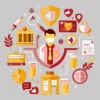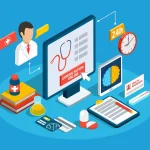
10 Uses of Computers in Hospital
Computers have revolutionized the healthcare industry, fundamentally reshaping operations, vastly improving patient care, and greatly enhancing overall efficiency. The uses of computers in hospital has become essential, offering a wide range of applications that bring significant benefits to both healthcare providers and patients.
In this article, we will explore the uses of computer in hospitals, highlighting their crucial role in advancing and optimizing modern healthcare practices.
Benefits Of Computers In Healthcare
Uses of computer in hospitals improve patient care by enabling accurate electronic health records (EHR) and real-time monitoring. They also enhance diagnostics, streamline administrative tasks, and support telemedicine, making healthcare more efficient and accessible.
Below down are the listed Benefits of computer in healthcare organizations.
1. Enhanced Patient Record Management
Computer use in hospital enable the digitization of patient records, making it easier to store, retrieve, and update information. Electronic Health Records (EHR) improve accessibility and organization.
Read more about : Electronic Health Records
2. Improved Diagnostics and Medical Imaging
Computers assist in generating high-resolution images like MRIs, CT scans, and X-rays, leading to more accurate diagnoses and treatment plans.
3. Efficient Telemedicine Services
Uses of computers in hospital allows healthcare providers to consult with patients remotely through telemedicine platforms, increasing access to care, especially in rural or underserved areas.
4. Advanced Data Analytics for Medical Research
Computers analyze vast amounts of healthcare data to identify trends, assist in clinical research, and develop personalized treatment plans based on big data insights.
5. Improved Patient Monitoring and Care Management
Computers are used in various patient monitoring systems, including ICU monitoring devices, wearable technology, and at-home care, ensuring real-time tracking of vital signs.
10 Uses Of Computer In Medical Field
There are several use of computer in hospitals, enhancing both patient care and administrative efficiency, such as
1. Managing Patient Records
Hospital computers facilitate the digital storage of patient records, allowing healthcare professionals to retrieve and update information quickly. This reduces paperwork and improves the coordination of care
2. Enhancing Patient Management
The uses of computers in hospital settings ensures efficient patient admissions, discharges, and transfers. By tracking patient flow and bed availability, hospitals optimize resource allocation and improve patient care
3. Medical Imaging And Diagnostics
Computers in hospitals are essential for medical imaging techniques such as MRI, CT scans, and X-rays. These systems provide detailed insights for accurate diagnoses and treatment planning.
4. Streamlining Laboratory Operations
Laboratories rely on hospital computers to manage test ordering, result entry, and reporting. This reduces errors and facilitates the integration of lab results with other patient records.
5. Telemedicine
The uses of computers in hospital extends to telemedicine, providing remote healthcare services through video conferencing and secure messaging. This is particularly beneficial for rural patients
6. Optimizing Pharmacy Operations
Computers are integral to hospital pharmacy management, automating tasks like medication dispensing and inventory control. This reduces errors and ensures accurate prescription processing.
7. Surgery And Robotics
Hospital computers support robotic-assisted surgeries, which are more precise and minimally invasive. Computers also assist surgeons with preoperative planning and simulation.
8. Billing And Financial Management
Hospital computer systems handle patient billing, insurance claims, and payment processing, improving financial operations and ensuring accurate transactions.
9. Staff Training And Education
Hospital computers offer platforms for continuous education through e-learning modules and simulation programs, helping healthcare staff stay updated on medical advancements
10. Communication In Hospital
Computer use in hospital enhance communication by connecting healthcare providers and administrative staff, ensuring that critical information is shared in real-time to improve overall hospital efficiency.
Uses Of Computer In Hospitals Pharmacy
The uses of computers in hospital pharmacies provides numerous advantages, such as:
- Maintaining digital patient medication records for personalized care.
- Managing inventory and updating stock levels in real time.
- Conducting data analysis to improve pharmacy operations and manage costs.
- Accessing drug databases for up-to-date information and safety guidelines.
- Streamlining billing and insurance claims processing to reduce errors.
Significant Role Of Computer In Hospital
Computers play a significant role in hospitals by streamlining administrative tasks, enhancing patient record management, and supporting diagnostic and treatment processes. They improve efficiency, accuracy, and overall patient care quality.
- Patient Data Management: The uses of computers in hospital settings enables efficient storage and retrieval of patient records through Electronic Health Records (EHR) systems.
- Diagnostic Tools: Computers assist in advanced diagnostic tools, including medical imaging and lab analysis, improving accuracy in diagnoses.
- Telemedicine Support: Facilitates remote consultations and telemedicine services, expanding access to healthcare.
- Hospital Administration: Streamlines hospital management tasks such as appointment scheduling, billing, and inventory tracking.
- Surgical Assistance: Computers aid in performing precise and minimally invasive surgeries through advanced robotic systems.
- Research and Drug Development: Supports research by analyzing large datasets and assisting in the development of new treatments.
5 Uses Of Computer In Hospitals For Kids
Computers play a crucial role in making hospitals more efficient and improving patient care, even for children. Here’s a look at how computer are used in hospitals for kids
- Managing Patient Records: Computers store important details about a child’s health, including medical history, test results, and treatment plans.
- Medical Imaging: Computers help in creating detailed images like X-rays and MRIs, making it easier to diagnose issues.
- Monitoring Health: Machines connected to computers monitor vital signs like heart rate and oxygen levels, ensuring children are safe.
- Telemedicine: Children can get care from doctors remotely using video calls, which is especially useful when traveling to the hospital is difficult.
- Educational Games: Some hospitals use computers to engage kids in fun, educational games while they recover, helping them feel more comfortable.
Uses Of Computer In Health Care Delivery System
The application of computer in health care has greatly improved the delivery of medical services. Computers help manage patient records, streamline appointments, and ensure accurate billing processes, making healthcare systems more efficient.
In addition, computer technology in healthcare supports advanced diagnostics through imaging technologies and lab analysis, improving the accuracy of treatments. They also enable telemedicine, allowing doctors to provide care remotely to patients in need.
Conclusion
The uses of computer in healthcare has transformed healthcare delivery by improving patient care, optimizing administrative processes, and enhancing medical research. From managing electronic health records to supporting robotic surgeries, the applications of computers in hospitals continue to expand as technology advances.
As we move forward, the continued integration of hospital computers will drive further improvements in healthcare, benefiting both providers and patients alike.
Frequently Asked Questions
How Do Computers Aid In Patient Management?
Computers in hospitals track patient admissions, discharges, and transfers, ensuring efficient use of hospital resources and timely patient care.
What Are The Uses Of Computer In Hospitals?
The uses of computers in hospitals includes managing electronic health records, improving patient management, aiding in medical imaging and diagnostics, facilitating telemedicine, and streamlining billing and administration.
How Do Computers Enhance Communication In Hospitals?
Integrated hospital computer systems facilitate seamless communication among healthcare providers, administrative staff, and patients, ensuring prompt information sharing and improved response times.
How Do Computers Assist In Emergency Response In Hospitals?
Computers provide real-time data and coordination tools that enhance emergency response, allowing healthcare providers to quickly assess and address critical situations.
How Do Computers Contribute To Research And Development In Hospitals?
Computers in hospitals facilitate data collection, analysis, and sharing, supporting medical research and the development of new treatments and technologies.
Enhance Patient Care and NABH Compliance with LazyMonkey
LazyMonkey is your all-in-one solution for improving patient care, retaining more patients, and meeting NABH standards. Our powerful QR-based feedback tool enables you to capture real-time insights from patient feedback, discharge surveys, staff and doctor evaluations, and clinical research, while also streamlining inter-departmental communication.
Transform your healthcare facility today - reach out to us at hello@lazymonkey.in, or request a demo here!
Elevate Your Restaurant Experience with LazyMonkey
LazyMonkey’s QR-based feedback system helps you gather real-time insights from customers, track satisfaction levels, and enhance the dining experience. Get instant feedback on your menu, service, and ambience, and make data-driven improvements to boost repeat customers and reviews.
Improve your restaurant today – reach out to us at hello@lazymonkey.in, or request a demo here!
Empower Student Engagement and Campus Improvement with LazyMonkey
LazyMonkey offers a seamless way to gather student feedback, track satisfaction, and enhance campus life. From course evaluations to dorm feedback, our QR-based solution makes it easy to capture valuable insights and improve student retention.
Upgrade your university experience – contact us at hello@lazymonkey.in, or request a demo here!
Streamline Feedback and Drive Performance Across Your Enterprise/Franchise with LazyMonkey
Whether you manage one or multiple locations, LazyMonkey’s QR-based feedback system helps you gather real-time employee and customer feedback. Improve operational efficiency, track satisfaction, and make data-driven decisions to enhance brand consistency and growth.
Transform your franchise today – reach out to us at hello@lazymonkey.in, or request a demo here!
Enhance Customer Satisfaction and Service Standards in Banking with LazyMonkey
LazyMonkey empowers banks to capture real-time feedback from clients across branches. Improve customer experience, assess service quality, and ensure regulatory compliance with our QR-based solution, helping you retain clients and meet banking standards.
Elevate your bank’s customer care – contact us at hello@lazymonkey.in, or request a demo here!
Boost Customer Engagement and Mall Satisfaction with LazyMonkey
LazyMonkey’s QR-based feedback tool enables you to collect feedback from shoppers, track satisfaction, and enhance the mall experience. Gather insights on store services, cleanliness, and entertainment to create an unmatched customer journey.














